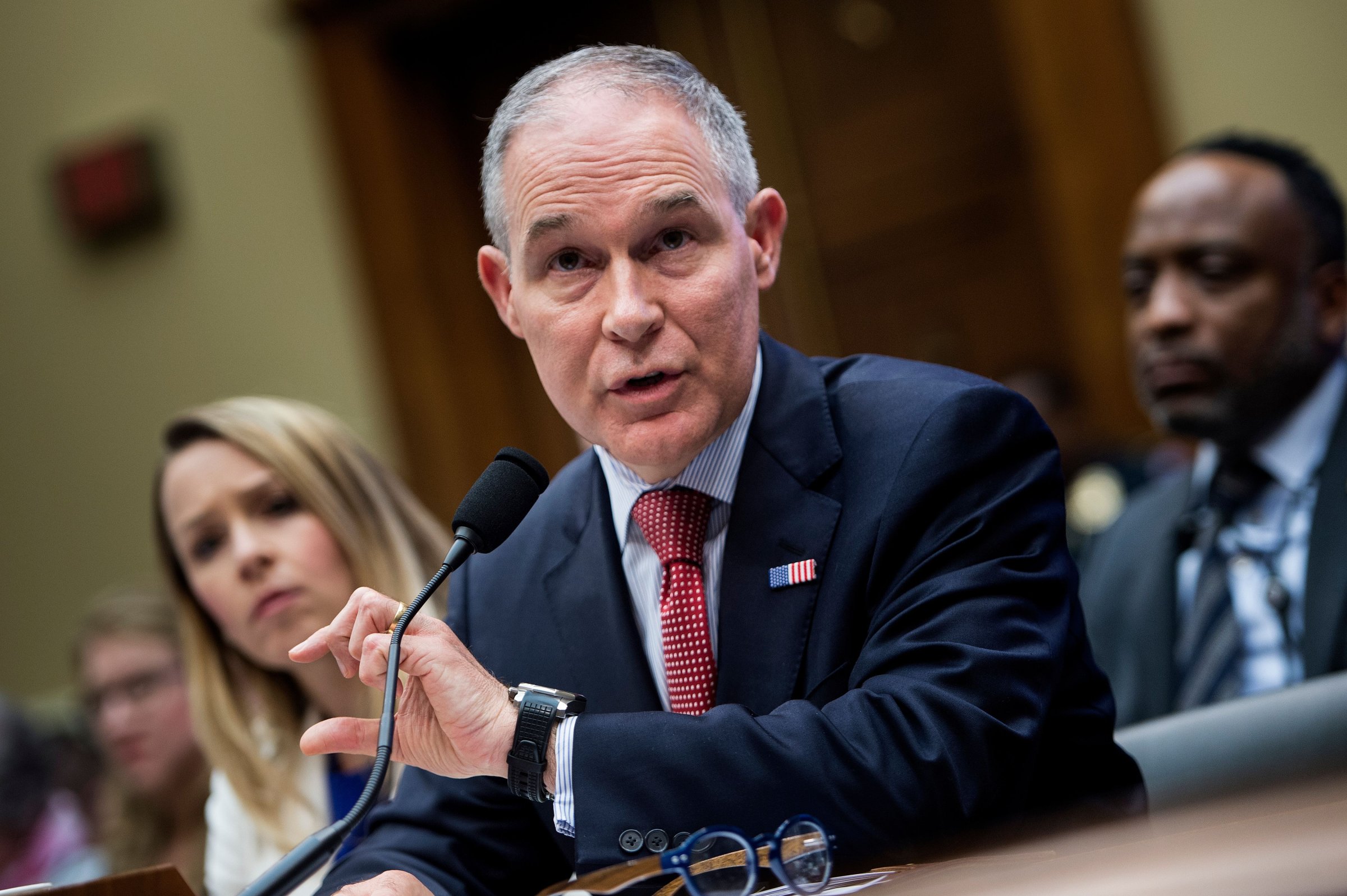
Scott Pruitt faces a long list of questions about his behavior as the head of the Environmental Protection Agency (EPA), from reports that he lived in a condo tied to a lobbyist with business before the EPA to his luxury travel expenses. But you wouldn’t know it listening to House Republicans question him during two appearances on Capitol Hill Thursday.
With few exceptions, Republicans rallied behind the embattled cabinet official, praising Pruitt and pushing him to continue his deregulatory agenda. “The greatest sin you’ve committed, if any, is you’ve actually done what President Trump ran on, won on and what he’s commissioned you to do,” said Rep. Kevin Cramer, a North Dakota Republican who advised President Trump on energy issues during the campaign.
Pruitt’s job remains in jeopardy. But the positive reception underscores his enduring popularity among conservative Republicans—and helps explain why Pruitt may still hang on to his position, despite weeks of negative headlines that would have ended the tenure of most other high-profile administration officials. President Donald Trump recognizes that Pruitt maintains strong support from the conservative base.
Chief of Staff John Kelly has long sought to oust Pruitt, administration officials say, but has not been able to convince the President that it is in his interest to do so. When pressed to fire Pruitt, Trump has replied that his base “loves Scott Pruitt” and considers the former Oklahoma attorney general “a star,” according to a senior White House official.
“The more anyone tells him to ditch Scott Pruitt, the more he wants to fight them,” the official tells TIME. “The President can be loyal, and he can be stubborn. This is him being both.”
To Trump, Pruitt’s actions at the EPA are among the reasons why Republicans are sticking with the President. Many supporters in deep red states have a particular distaste for EPA regulations like the Waters of the U.S. rule, which gives the federal government significant authority over many small bodies of water across the country. The Clean Power Plan, an Obama-era rule that sought to push states away from coal-fired power plants, has also drawn the ire of Trump supporters in coal-producing states like West Virginia and Wyoming. These issues, distant in the minds of many American city dwellers, are top-tier concerns in much of rural America. And Pruitt has launched an all-out effort to overturn those rules.
“He’s following through more than any member of the administration,” says Tim Huelskamp, a former GOP representative from Kansas and the president of the conservative Heartland Institute.
Trump’s impression of Pruitt channels some of his closest supporters. Trump donors in industries regulated by the EPA have called for sweeping deregulation, and they believe Pruitt has delivered. Coal executive Bob Murray, whose company Murray Energy donated more than $1 million to Trump-linked outside spending groups last year, dismissed criticism of Pruitt as “much ado about nothing” in an interview with TIME earlier this month. Murray had asked Pruitt to repeal several regulations that Pruitt has subsequently targeted. It’s “simply a criticism by liberals of the star of the Trump administration,” he said. “He’s done more for America and the right wing than any other appointee.”
Pruitt’s double header before two House subcommittees Thursday was not without fireworks. Democrats offered blistering condemnation; Rep. Tony Cárdenas of California said Pruitt’s behavior was an “embarrassment,” while Rep. John Sarbanes of Maryland described Pruitt as “a poster child for the abuse of public trust” in the Trump administration. Rep. Anna Eshoo of California asked simply: “Do you have any remorse?”
Many of the Democrats’ critiques went unanswered, while Pruitt deflected others with drab talking points. But at one point lawmakers caught Pruitt contradicting a claim he made in a Fox News interview earlier this month that he was not aware of significant pay raises offered to two of his staffers. On Thursday, Pruitt said he had been informed about the raises—just not their size or that his staff had gone around the White House to offer them.
With reporting by Philip Elliott/Washington
More Must-Reads from TIME
- Why Trump’s Message Worked on Latino Men
- What Trump’s Win Could Mean for Housing
- The 100 Must-Read Books of 2024
- Sleep Doctors Share the 1 Tip That’s Changed Their Lives
- Column: Let’s Bring Back Romance
- What It’s Like to Have Long COVID As a Kid
- FX’s Say Nothing Is the Must-Watch Political Thriller of 2024
- Merle Bombardieri Is Helping People Make the Baby Decision
Write to Justin Worland at justin.worland@time.com